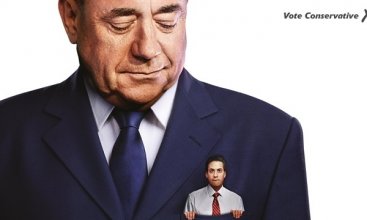How ‘Red Ed’ Miliband won the UK election ad campaign
I’ve no idea who’s going to win Thursday’s election – the latest polls shows the Tories and Labour neck and neck on 33 per cent, as they pretty much have throughout – but we can, at least, offer a view on who won the ad campaign.
And it sure as hell wasn’t David Cameron and the Tories. The prime minister is a lousy General Election campaigner, he just doesn’t look comfortable outside his native environment. This doesn’t include getting down and dirty on the streets.


Cameron is prime ministerial, he’s good in one-to-ones with sympathetic journalists (as an ex-PR man should be) and in the House of Commons with a baying pack of Tory MPs behind him.
But on his own, under pressure, he seems diminished, which is why his minders have kept him under wraps, refusing to debate with Ed Miliband, for example. The Tories may well be the largest party but they’ll win less of a share of the vote than 2010. Hardly a successful campaign.
Miliband, on the other hand, has had a good campaign and should be voted the winner of this particular contest. He began with subterranean polls ratings as a leader-in-waiting and, while he’s still not won over most people, he has shown that, despite the best efforts of the Sun, the Daily Mail and the Tories, of course, he isn’t a mad leftie with two heads.
Cameron’s refusal to debate with him perversely allowed Miliband more media space. And, for the most part, he’s used it cleverly. He’s said all along it’s about policies not personalities and he’s announced some potentially popular ones.
The promise to curb private rents could be crucial. The Tories’ only rejoinder was to say it would foul up the rental market. It might, but going in to bat for private landlords is hardly a vote winner.


Again, this may be true but, as with all these things, there’s a danger of wear-out. BBC Radio seems to have done more roamin’ in the gloamin’ this time round than it did in the Scottish independence referendum. The SNP’s Nicola Sturgeon and Alex Salmond (the former leader likely to be the real SNP power in Parliament) have, mostly, kept their kingmaker ambitions under wraps – wisely.
The Liberal Democrats and leader Nick Clegg have fought a skilful campaign. The party’s problem is that, as far as the polls are concerned, people aren’t being asked “would you vote Lib Dem in a coalition?” although this is its strategy. Therefore it hasn’t got the bounce it needs.
The Lib Dems will still win more seats than Ukip, even though Nigel Farage’s party is well ahead of Clegg’s in the polls, on about 13 per cent at the time of writing against the Lib Dems’ eight per cent. But it hasn’t really happened for Ukip. Farage, a Marmite figure if ever there was one, has needed stronger support and hasn’t received it.
We’ll leave it there. ‘Red Ed’ Miliband has won the ad campaign by not being so red at all. He might win the real contest too.
This article first appeared in International Business Times.









